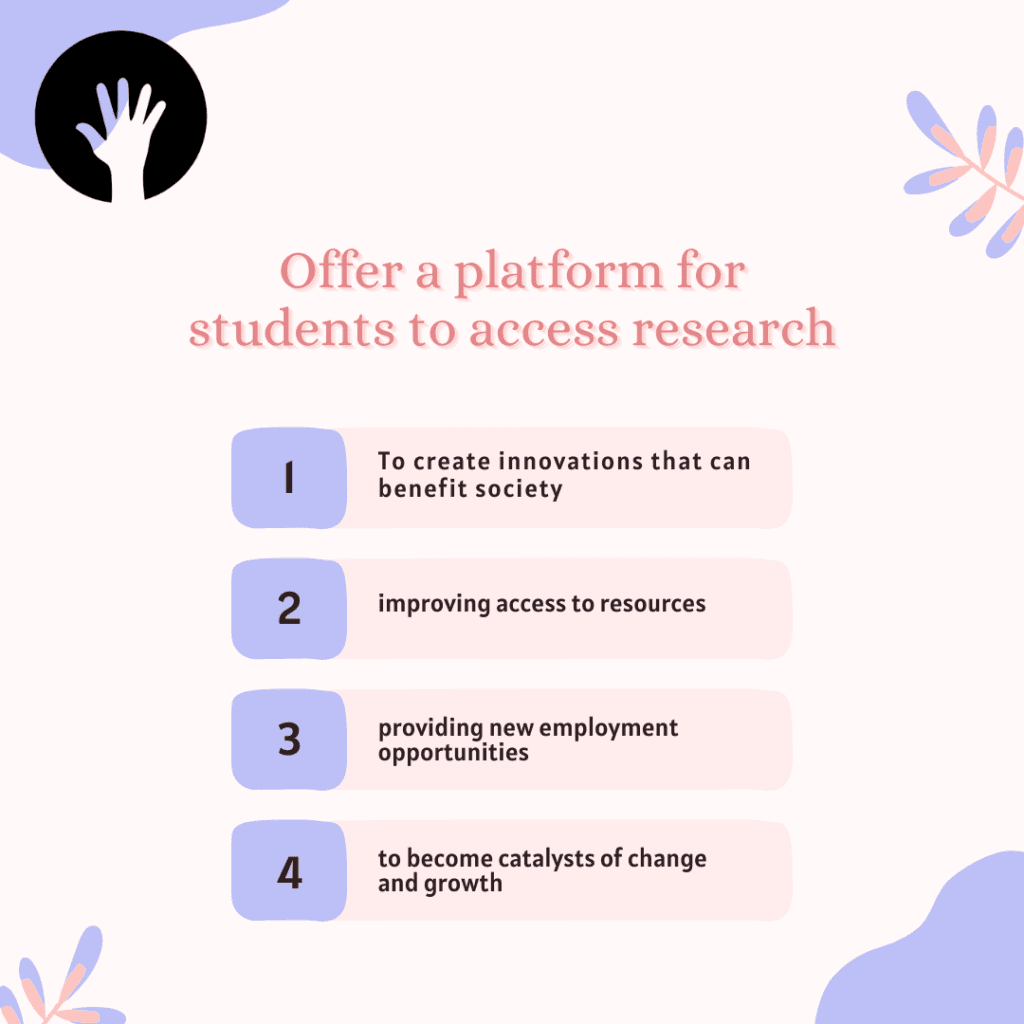
Universities and governments around the world are becoming increasingly supportive of entrepreneurship and student entrepreneurs and the endeavors they are undertaking. Through various initiatives and programs, organizations are providing resources, mentorship, and access to educational opportunities that can help young entrepreneurs develop the knowledge, experience, and networks necessary to launch their ventures. Governments and universities are also creating an environment that encourages innovation, risk-taking, and creative problem-solving, which are all critical components of a successful entrepreneurial journey. Furthermore, these institutions are recognizing the importance of entrepreneurship in helping to drive economic growth, create jobs and foster a culture of creativity and innovation.
It plays an important role in support of student entrepreneurship. By providing resources, such as mentorship programs, workshops, and seminars, universities can help students develop the skills and knowledge needed to become successful entrepreneurs. Additionally, universities have access to a wide network of alumni and other professionals who can provide insight into the entrepreneurial process. Governments can also provide support to aspiring entrepreneurs by offering tax incentives, grants, and other forms of financial assistance.
It has increasingly embraced entrepreneurial learning and experience as an important part of the educational process. From providing seed funding to offering courses, internships, and even whole departments dedicated to teaching entrepreneurship, there is a myriad of ways these institutions support students in their pursuit of creating successful businesses. In addition to the monetary support often necessary for start-up ventures, universities also offer a platform for students to access research, mentorship, and networking opportunities that can give them a competitive edge when it comes to launching their businesses. Governments too have taken steps to foster an entrepreneurial spirit in the population, creating initiatives that provide tax breaks for certain types of businesses and encouraging partnerships between public and private entities.
It has an important role to play in helping to foster a culture of entrepreneurship among students. By providing resources and funding, they support the growth of startups and other small businesses. These resources can be in the form of grants, training programs, or access to industry mentors and advisors. Universities can also organize workshops, seminars, and networking events to bring students and business professionals together.
They are increasingly recognizing the potential of entrepreneurship to bring innovative new products and services to the market, while also providing students with more career opportunities. As a result, they are investing in support initiatives to equip young entrepreneurs with the knowledge, skills, and resources they need to succeed in their ventures. Governments are providing grants and subsidies to universities to fund entrepreneurship initiatives, such as incubators and accelerators, while universities are facilitating access to resources such as mentorship programs and startup workshops. Through such initiatives, universities enable students to gain vital experience in launching a business and navigating the entrepreneurial process.
They are also providing students with the opportunity to pursue entrepreneurial activities outside of the classroom. By connecting students with potential investors, sponsors, and mentors, universities are helping students to identify potential sources of capital and resources to launch their ventures. Furthermore, universities are organizing hackathons, competitions, and hack challenges where teams of students can come up with innovative solutions to real-world problems. Through these activities, students can develop the necessary skills to identify opportunities and create solutions that can lead to successful businesses.
They are well-positioned to provide students with the necessary resources and guidance to become entrepreneurs. Moreover, they can create an environment of collaboration and innovation that can foster the growth of young startups and provide students with the opportunity to gain valuable experience. As such, universities should continue to invest in entrepreneurship initiatives and create more opportunities for students to engage in entrepreneurial activities. This will not only benefit the students but also create a thriving entrepreneurial ecosystem for universities and their communities.
Furthermore, they are providing students with access to resources and services that would not be available to them otherwise. These include the use of the university’s facilities such as research labs, library services, and access to grant funding for startup projects. Universities are also offering mentorship programs and other educational opportunities to help students get a jump start on launching their businesses. Finally, universities are providing their students with access to industry professionals and networks that can give them advice and guidance on launching their ventures.
They are providing a platform for students to network with industry professionals, allowing them to access potential investors, mentors, and advisors. By connecting with those in the business world, students can gain valuable insights into what it takes to succeed in the business world. Additionally, universities are offering seed funding to help young entrepreneurs get their ideas off the ground. By providing financial support to budding entrepreneurs, universities are creating an environment that encourages innovation and risk-taking.
To ensure the success of such initiatives, universities must provide a comprehensive suite of services to support student entrepreneurs. This includes providing access to resources such as seed funding, networking and mentorship opportunities, and guidance on market research and the legal aspects of launching a business. Furthermore, universities should create an environment that encourages collaboration and innovation, such as by offering co-working spaces for entrepreneurs to meet and work together. By establishing strong partnerships between universities and governments, and providing students with the resources they need to succeed, universities are playing an important role in developing the future of entrepreneurship.
In addition to the resources mentioned above, universities can also help facilitate the success of student entrepreneurs by providing access to mentorship programs and advising services. By connecting entrepreneurs with experienced professionals in the field, universities can provide invaluable guidance and support for entrepreneurs as they strive to turn their ideas into reality. Furthermore, universities can create opportunities for entrepreneurs to meet with potential investors and partners, helping them make key connections in the business world. By providing these resources and services to student entrepreneurs, universities foster a thriving entrepreneurial ecosystem that will benefit future generations.
By offering these resources, universities are enabling students to pursue their entrepreneurial ambitions and contribute to the economy. As such, universities can have an immense impact on the economy and society. Through their support of entrepreneurship, universities are creating jobs, stimulating economic growth, and helping to build a more prosperous and equitable society. Furthermore, universities provide a platform for the next generation of innovators to share ideas, find solutions to real-world problems, and create a prosperous future.

It also offers programs specifically designed to nurture entrepreneurship, such as incubator and accelerator programs. These programs provide students with the necessary resources to launch a successful venture, such as access to funding, mentorship, and connections to potential partners and investors. Additionally, universities are now offering courses on entrepreneurship, which provide students with the skill sets and knowledge they need to succeed. By investing in students and providing them with the tools they need to succeed, universities are equipping the next generation of entrepreneurs to make a difference in the world.
Additionally, universities are also helping to foster a culture of entrepreneurship by offering programs and courses that teach students the skills they need to launch and manage a business. By teaching students the essential concepts and skills required to launch a successful business, universities are providing a platform for students to put their ideas into action. Moreover, universities are connecting students with mentors, who can provide valuable guidance and advice to help them navigate the journey of becoming an entrepreneur. By providing students with resources and support, universities are fostering an environment that encourages creativity and experimentation and is helping to build the future of entrepreneurship.
For universities to continue to play a leading role in the development of the entrepreneurial ecosystem, they must ensure that they are providing quality resources and support to student entrepreneurs. Additionally, they must continue to foster a culture of innovation and risk-taking. Furthermore, universities should strive to create a diverse and inclusive environment that is welcoming to all entrepreneurs, regardless of background or experience. By providing the right resources and creating an atmosphere of collaboration, universities can play an invaluable role in helping to shape the future of entrepreneurship and foster economic growth.
